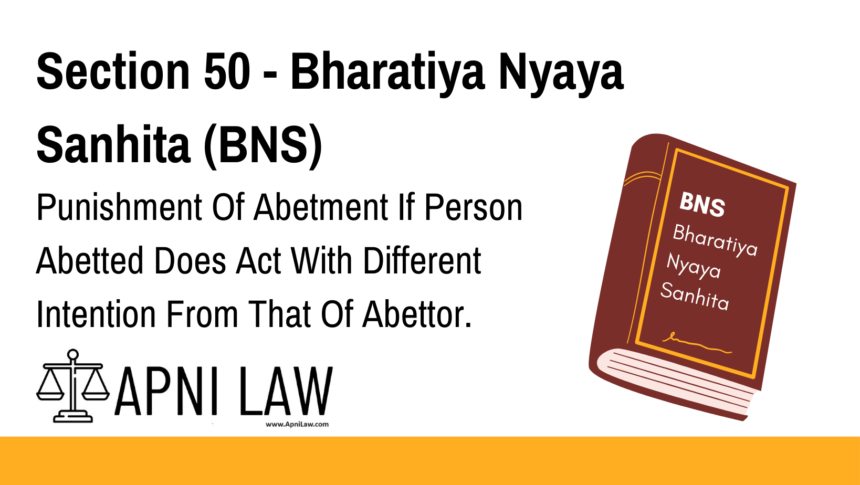Code : Section 50 BNS
Whoever abets the commission of an offence shall, if the person abetted does the act with a different intention or knowledge from that of the abettor, be punished with the punishment provided for the offence which would have been committed if the act had been done with the intention or knowledge of the abettor and with no other.
Explanation of Section 50 BNS
Understanding the Provision
Section 50 of the Bharatiya Nyaya Sanhita (BNS) deals with situations where:
- A person abets an offence with a certain intention.
- However, the person who actually commits the act does so with a different intention or knowledge.
- In such cases, the abettor is punished based on their own intention or knowledge, rather than the actual outcome of the offence.
Key Elements of Section 50 BNS
- Abetment of an Offence
- The abettor must have intentionally encouraged, aided, or conspired in the commission of an offence.
- Different Intention or Knowledge
- The person who actually commits the act does so with a different mindset than the abettor.
- Punishment Based on Abettor’s Intention
- The abettor is punished as if the offence had been committed with their intended purpose, irrespective of the actual motive of the person who carried out the act.
Illustration of Section 50 BNS
Example 1: Robbery vs. Murder
A hires B to commit robbery at a shop. However, during the robbery, B kills the shopkeeper. Since A only abetted robbery, A is punished for the offence of robbery and not murder.
Example 2: Arson vs. Accidental Death
X instigates Y to set fire to an abandoned house for insurance fraud. However, Y unknowingly burns down an occupied building, causing multiple deaths. X will be punished for arson as per their intention, not for mass murder.
Common Questions & Answers on Section 50 BNS
1. What happens if the actual offender commits a more serious crime than intended by the abettor?
The abettor is only punished for what they intended, not for the unexpected outcome.
2. Can the abettor be punished even if the act was committed with a different motive?
Yes, the abettor faces punishment based on their original intent under Section 50 BNS.
3. How is Section 50 different from Section 49 BNS?
- Section 49 BNS (Read More) applies when the abetted offence occurs as a direct consequence of abetment.
- Section 50 BNS applies when the actual offence differs from what the abettor intended.
4. What if the abetted person commits an entirely different crime?
If the act committed is completely different and unrelated to what was abetted, the abettor may not be held liable under Section 50.
5. Does the law consider the abettor’s knowledge in determining punishment?
Yes. The punishment depends on what the abettor knew or intended while abetting the crime.
Conclusion
Section 50 BNS ensures that abettors are punished based on their own intent, even if the actual offender commits a crime with a different mindset. This law prevents abettors from escaping liability simply because the final offence differs from their initial plan.
For more legal insights, visit ApniLaw today! 🚀








